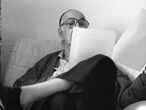Jorge Cela Trulock, in 2016, during the presentation of the acts of the centenary of the birth of his brother Camilo José Cela. Luca Piergiovanni / (EPA) EFE
Jorge Cela Trulock's last job was to take care of the style of the Spanish Television news programs. There he was respected as an authority that he did not claim, but that floated in the calm and polite air with which he surrounded his corrections. Editor and writer of novels, for him he would have signed with the initials JCT, because he never in his life wanted to boast of anything, least of all having a Nobel Prize for his brother. Camilo José Cela, who was called
Camilo el del Premio,
always had him as his little brother, but he tried not to present himself as such or express envy or disdain anywhere
.
He was 88 years old and died last Friday in Madrid, where he was born.
In 1964, with Camilo and some of his brothers, they founded Alfaguara, of which they had editorial control until the label became part of the Santillana Group.
More information
Camilo José Cela, in 600 objects
Jorge Cela Trulock wins the Antonio Machado
At noon when his brother won the Nobel Prize, Jorge was fulfilling his duties at TVE. Jesús Hermida wanted to attract him to the afternoon program in which Don Camilo acted as a social gathering, and Jorge agreed at the end as if he were fulfilling a work obligation. In many interviews of the time, journalists encouraged by the controversies surrounding Spain's most popular writer in recent decades tried to find some trace of reluctance in their younger brother. He always declared admiration and respect for him, and followed with a fraternal attitude the tributes that his son, the writer Camilo José Cela Conde, organized on the occasion of the centenary of the author's birth. In 1987, when CJC won the Prince of Asturias Award, Jorge Cela wrote in EL PAÍS:“My friends from EL PAÍS tell me that I must write about fifty lines as long as CJC has claimed the language. (…) And it turns out that it is going well for Camilo to vindicate. Because the language has always embroidered it, something that not even its enemies, who always exist, can deny it, and it has embroidered it because it learned it in the classics, when I was not yet born, and it was not forgotten, and especially not he wanted to forget it ”.
Since his performance as an editor, he has worked in favor of the careers of other colleagues
Among the legends that circulated about Jorge Cela's literary aspirations there is one that tells that his family, encouraged by the success of the eldest son, confined him to prepare to match him. One day, according to this story, his teenage friends went to look for him to play in those postwar streets of Madrid. The maid dissuaded them from looking for him: "The young man is reading Dostoevsky." Far from this Cela Trulock any temptation to emulate or fight for fame. A writer himself, he was publishing his books, novels or stories, with the rhythm that he wanted, without competing with the Nobel Prize winner or any of his contemporaries. Unlike,Since his work as editor, he has worked in favor of the careers of other colleagues who in the sixties of the last century wanted to make their way down the path of recognition. One of them, Manuel Vicent, published with the Alfaguara de los Cela his first book, a short novel,
El resuello,
which appeared in a collection of novels, including Alfonso Grosso and Jesús Torbado.
The author of
Tranvía a la Malvarrosa
said this Sunday:
“He published that book, it led me to compete for the first prize I won, the Alfaguara of its time, and it was an incredible help for my whole life.
That's why I always called him 'Cela el bueno'.
He was, say colleagues he had on TVE, "a man of character, but he was not a fighter," and he was shy, unable to use his knowledge to humiliate his companions. But he was a tenacious defender of the language, capable of spending hours explaining "that there is no plural alternative", patiently defending the language from what he considered an irreversible deterioration. He said he was there, in the newsroom, as an assistant to those who had doubts. As a novelist he maintained that humility of character to the end. At that time when the manuscript was already delivered on disk, he would go to publishers displaying that container with these words: "Here is the disk."
He was the author of several novels. With
All Windows
(1994) he returned as an author to Alfaguara and in
El misleading good of words
(Huerga and Fierro, 2015) he demonstrated his most public passion, of which he felt so proud: to watch how others wrote without showing off never how he wrote.

